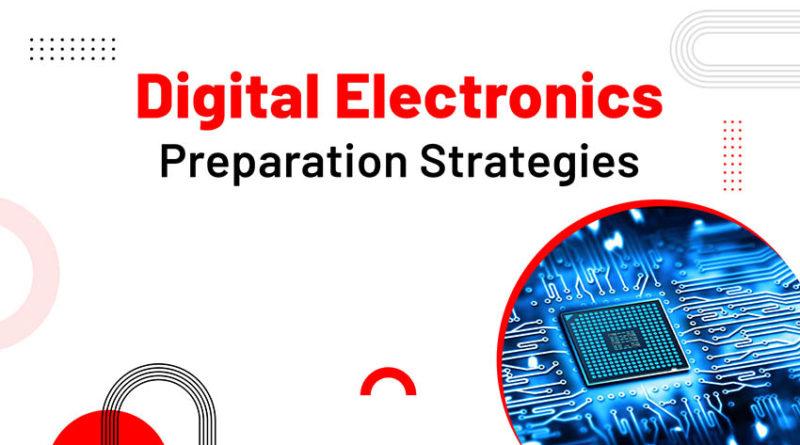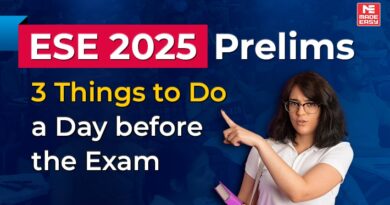Digital Electronics: Preparation Strategies
Every exam aspirant must follow the right preparation strategy for ESE/IES and GATE to secure a decent score and rank in the examination. It is especially applicable to a high-scoring subject like Digital Electronics. According to the latest syllabus, Digital Electronics is one of the important core subjects that one cannot skip when it comes to GATE or IES/ ESE exam preparation for the Electrical Engineering stream. However, serious competitive exam aspirants must avoid spending a lot of effort and time in preparation for any one subject. It is always a good idea to strategize and plan your preparation before starting it. Therefore, we have presented the preparation strategy for Digital Electronics in this blog post, so that aspirants get an idea regarding the important topics in Digital Electronics for GATE from the exam point of view and can plan their studies accordingly.
What is digital electronics?
Digital electronics is one of the important topics of electrical engineering that primarily deals with the study of digital signals with the components that use these signals.
Why Study Digital Electronics?
As an engineer with a background in Electrical Engineering, you will have to deal with information related to different types of signals. In practice, all real-life signals are analog. At first sight, it seems the use of analog is much better as compared to a digital signal. However, digital signals have various advantages over analog signals like noise immunity, and more information per unit of time, to name a few. Therefore, one can convert analog signals into digital signals and use them in Signal Processing, Control engineering, Microelectronics, Telecommunication engineering, and several other branches that belong to Electrical Engineering and related branches that deal with a comparatively small power source.
Core Electrical and Power engineers usually have to deal with high-power applications of electricity and while doing so, it becomes essential to have a sound understanding of this subject.
Applications of Digital Electronics:
Digital electronics finds several applications in various streams of engineering, some of which are enlisted below:
- Digital Electronics has a number of applications in fields ranging from something as simple as the display of your digital watch or the count-down timer which you see at traffic signals in a few countries, to something as complex as Rocket Science or Quantum Computing,
- The fundamentals and implementation of digital electronics are essential to understanding the design and working of consumer/industrial electronics, embedded systems, computers, security, and military equipment.
- Digital electronics also find application in various modern-day technologies such as LCD/LED TVs, smartphones, ATMs, and credit/debit cards.
To study and understand all Digital electronics, we must know the basics of Digital electronics to answer Digital electronics questions in a much better way.
About Digital Electronics:
Digital electronics engineers mainly deal with the control, conversion, and conditioning of Analog Signals using semiconductor devices such as switches. Analog systems are those in which the voltage level assumes an infinite number of distinct values. Whereas in all modern digital circuits there are just two discrete voltage levels. Digital circuits are often called switching circuits because the voltage levels in a digital circuit are assumed to be switched from one value to another instantaneously. Digital circuits are also called logic circuits because every digital signal obeys a certain set of logical rules.
Reference Books:
When preparing for the above-mentioned competitive exams, one can refer to M. Morris Mano’s authored books for the theory part. If you want to strengthen the numerical part of the digital electronics subject, A. Anand Kumar for the numerical part. For instance, Fundamentals of Digital Electronics offers the required guidance to competitive exam aspirants. Although, it is highly advisable to create your own Digital Electronics notes and short notes of key points for proper practice, understanding, and revision later. In case of any doubt or discrepancy, one may refer to the above books to study digital electronics topics in the best possible manner. Aspirants will find it beneficial to prepare the high weightage for GATE and ESE exams with the help of the questions and solved answers and examples in these popular books.
Important Topics:
According to the latest GATE 2023 syllabus, analog and digital electronics topics form a critical part of the Electrical Engineering stream.
This includes the following:
- Simple diode circuits: clipping, clamping, rectifiers.
- Amplifiers: biasing, equivalent circuit and frequency response; oscillators, and feedback amplifiers.
- Operational amplifiers: characteristics and applications; single stage active filters.
- Active Filters: Sallen Key, Butterwoth, VCOs and timers, combinatorial and sequential logic circuits, multiplexers, demultiplexers, Schmitt triggers, sample and hold circuits, and A/D and D/A converters.
If you are preparing for the ESE 2023, your exam preparation strategy for analog and digital electronics must revolve around the following topics present in the digital electronics syllabus:
- Operational amplifiers – characteristics and applications, combinational and sequential logic circuits, multiplexers, multivibrators, sample and hold circuits, A/D and D/A converters, basics of linear integrated circuits, and simple active filters.
- Analog communication basics, Modulation, and de-modulation, noise and bandwidth, transmitters and receivers, signal-to-noise ratio, digital communication basics, sampling, quantizing, coding, frequency, and time domain multiplexing, and power line carrier communication systems.
Note: Some topics are similar for both GATE and ESE competitive exams. You can prepare these topics at the same time to avoid time wastage and better preparation.
How to prepare digital electronics for competitive exams?
After planning and strategizing for the GATE and ESE exams properly, it is equally necessary to work on the implementation of the plan and exam preparation strategy. Here are the tips and tricks that will help you reap the best results at the right time:
- After completion of each chapter, make it point to revise the concepts learned during self-study sessions or classroom given on the same day itself to store them better in the memory.
- Plan proper revision of the complete subject after course completion.
- Right from the time you start to create classroom notes and micro notes, you must ensure that you create them such that you can quickly revise with the notes.
- Revise sequential circuits and counters multiple times, as these topics consume less time, easier to prepare, and carry more weightage in the GATE and ESE exams.
- You need to prioritize practicing as many questions as possible from quality sources for better understanding.
- Do not fall for unverified sources of study. Apart from the reference books stated, you can refer to the theory book provided in the class and question banks for practice.
- After multiple revisions, it is important to appear for the test series of a good institute. It includes the different levels of questions that increase understanding of each topic and each concept.
- Topic-wise subject tests help one in identifying one’s weak areas. Accordingly, students can work on these areas and score the target marks in the exams.
It is easy to concentrate on either speed or accuracy at once, but GATE and ESE exams demand concentration on accuracy in a limited time. Consistent practice and joining a good test series can help you achieve this successfully.
We hope this blog helps you with the preparation strategy for Digital Electronics for the ESE and GATE exams.
Dear Aspirants,
Your preparation for GATE, ESE, PSUs, and AE/JE is now smarter than ever — thanks to the MADE EASY YouTube channel.
This is not just a channel, but a complete strategy for success, where you get toppers strategies, PYQ–GTQ discussions, current affairs updates, and important job-related information, all delivered by the country’s best teachers and industry experts.
If you also want to stay one step ahead in the race to success, subscribe to MADE EASY on YouTube and stay connected with us on social media.
MADE EASY — where preparation happens with confidence.

MADE EASY is a well-organized institute, complete in all aspects, and provides quality guidance for both written and personality tests. MADE EASY has produced top-ranked students in ESE, GATE, and various public sector exams. The publishing team regularly writes exam-related blogs based on conversations with the faculty, helping students prepare effectively for their exams.




